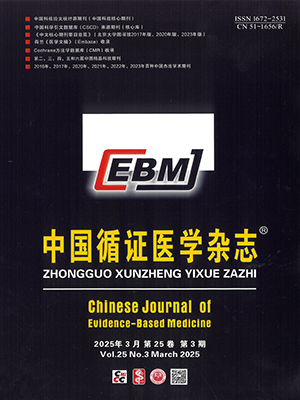Objective To evaluate and select essential medicine for urolithiasis using evidence-based methods based on the burden of disease.
Methods By means of the approaches, criteria, and workflow set up in the second article of this series, we referred to the recommendations of evidence-based or authority guidelines from inside and outside China, collected relevant evidence from domestic clinical studies, and recommended essential medicine based on evidence-based evaluation. Data were analyzed by Review Manager (RevMan) 5.1 and GRADE profiler 3.6 to evaluate quality of evidence.
Results (1) Three evidence-based guidelines were included. Based on WHOEML (2011), NEML (2009), CNF (2010) and the quantity and quality of evidence, we made a recommendation for diclofenac sodium, nifedipine, allopurinol and ibuprofen used in symptomatic treatment of urolithiasis. (3) Results of domestic studies (including four RCTs, n=566; two observational studies, n=96) indicated that calculus-removed rates of diclofenac sodium, nifedipine and allopurinol were 91.5%, 86.4%~93.3% and 86.4% respectively with significant differences. Diclofenac sodium daily cost 7.00 to 8.57 yuan, nifedipine 1.48 to 4.44 yuan, and allopurinol 0.24 to 0.82 yuan. Ibuprofen had a total efficiency of 94.5% with a significant difference for alleviating renal colic, which cost 0.11 yuan daily. Four recommended medicines with safety, clinical efficacy, high economical efficiency and applicability had been marketed with specifications and dosage forms corresponding to guidelines in China.
Conclusion For urolithiasis: (1) We offer a b recommendation for diclofenac sodium (capsule/tablet, 50 mg×24, or 25 mg×24) which is contradicted in patients with gastrointestinal bleeding and in pregnant women or women with planned pregnancy. (2) We offer a weak recommendation for nifedipine (tablet/capsule, 10 mg×100 or 10 mg×60) which is contraindicated in dialysis-receiving patients with malignant hypertension and should be cautiously used in patients with irreversible renal failure. (3) We offer a weak recommend allopurinol (tablet, 100 mg×100) which is contraindicated in patients with allergic reaction, severe insufficiency of the liver or kidney, or significant lack of blood cells. (4) We offer a b recommendation for ibuprofen (tablet, 20 mg×20) which is contraindicated in patients with allergic reaction to aspirin.
Citation: YANG Zongxia,LI Xiao,LI Youping,WANG Li,LI Honghao,YANG Xiaoyan,SHEN Jiantong. Evidence-Based Evaluation and Selection of Essential Medicine for Township Health Centre in China: 15. Urolithiasis. Chinese Journal of Evidence-Based Medicine, 2012, 12(8): 984-990. doi: 10.7507/1672-2531.20120154 Copy
Copyright © the editorial department of Chinese Journal of Evidence-Based Medicine of West China Medical Publisher. All rights reserved
-
Previous Article
Evidence-Based Evaluation and Selection of Essential Medicine for Township Health Centre in China: 14. Bone Fracture -
Next Article
Evidence-Based Evaluation and Selection of Essential Medicine for Township Health Centre in China: 16. Middle-aged and Elderly Women with Primary Osteoporosis




